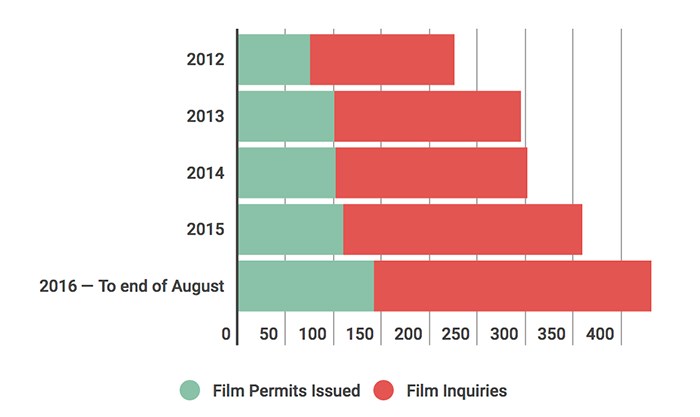Filming activity in the Coquitlam is up dramatically in 2016, an increase the city is crediting to the low Canadian dollar and provincial tax incentives.
According to economic development manager David Munro, 141 permits have been issued as of the end of August, while the city has received 290 inquiries. Those figures are up significantly compared to 2015, when 109 permits were issued and 250 inquiries were received in the entire year.
While the revenue from the permits is relatively small compared to the city budget, Munro said the economic spinoffs benefit local businesses and workers.
“Our film office has definitely experience a positive impact from the lower Canadian dollar and upswing in filming activity in the Metro Vancouver area,” he said in an email. “The increased activity positively impacts our local economy through job creation and the purchasing of local goods and services.”
The numbers are also up in neighbouring Port Coquitlam, where the city went from four permits in 2013, five in 2014 and 11 in 2015.
Some of the movie and TV productions that have filmed in the area in 2016 include Death Note, Legends of Tomorrow, Love It Or List It, Man in the High Castle, Prison Break and The Magicians.
Some film productions contribute directly to municipal services.
For instance, when work on season two of the television series Wayward Pines wrapped up earlier this year, the set the production company used at Princeton Avenue and Trafalgar Street on Burke Mountain was demolished to make way for a park. Munro said proceeds from the film permit will help pay for the new amenity.
Industrial space is also being sought after by companies looking to film on indoor sets.
But despite multiple inquiries, Munro said Coquitlam’s industrial vacancy rate of 1% has made it difficult for productions to set up in local warehouses. “Over the last year or so, we have had a number of inquiries about opportunities to film in industrial space,” he said. “However, with our industrial vacancy rate being at an all-time low… the amount of filming activity in industrial areas has been limited.”
While 2016 has been a record year for filming in Coquitlam, next year could be even better.
The city is looking at ways of improving its film permit process and will focus on marketing the municipality as a destination for filming, according to a staff report.
@gmckennaTC



